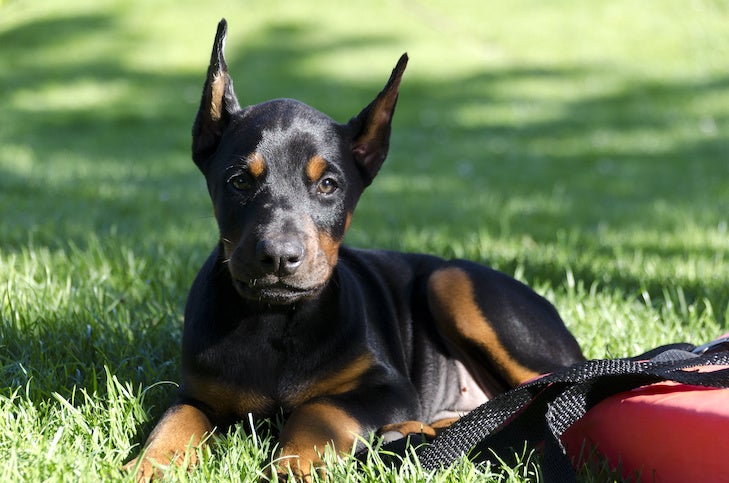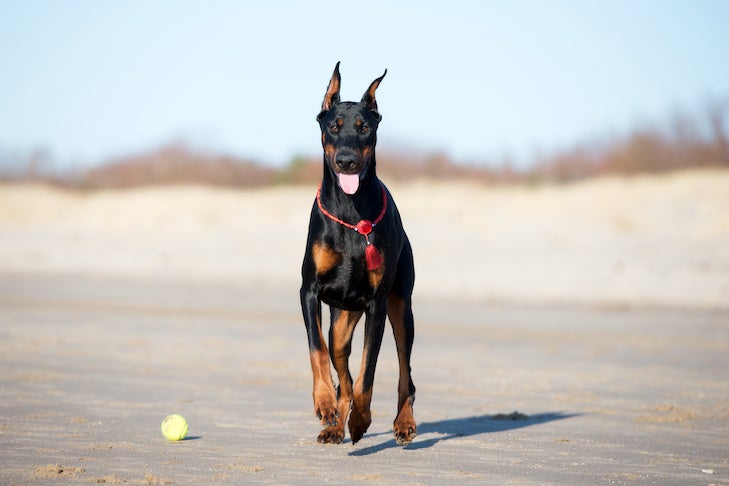The Doberman Pinscher has the distinction of being one of the only breeds in the AKC’s Working Group that was bred specifically to be a companion to humans. The breed was created in the nineteenth century by German tax collector Louis Dobermann to accompany him in his thankless daily work. Drawing upon this breed legacy, today’s Doberman is courageous, loyal, and vigilant, while maintaining the ability to be an excellent companion.
Marc Goldberg, IACP-CDTA, of Chicago Dog Trainer, is coauthor with the Monks of New Skete of Let Dogs Be Dogs and The Art of Training Your Dog, and was named to the International Association of Canine Professionals Members Hall of Fame in 2014. He has found the Doberman to be “one of the most elegant breeds of dogs, a true working dog and family companion. A trained Doberman is a happy dog who can spend more time with you.”
Getting Off to the Right Start
Your path to a well-trained Doberman Pinscher actually begins before you bring your puppy home; it starts with a reputable breeder or breed rescue. Be sure to do your homework to ensure you are getting a puppy from a breeder or rescue that has already begun socializing their puppies.
Rebecca Roter, of Aludra Dobermans, is an AKC Breeder of Merit, longtime member of the Doberman Pinscher Club of America, and Chair of the DPCA Public Education Committee. She begins exposing her puppies to biostimulation as early as 10 days of age. “I expose them to new objects, surfaces, and noises—tactile and auditory stimuli. I let them explore, with supervision. My puppies are all exposed continuously to developmental challenges.” All this occurs before she sends puppies to their new homes so they can have the best possible start.
Diana Burk, of Rockmere Dobermans, is also an AKC Breeder of Merit, and says that prospective puppy owners should interview breeders and not be afraid to ask any and all questions. “Speak to the breeder extensively over the phone. Do your homework. Look for breeders who are showing their dogs, and doing all the recommended health and genetic screenings.”

8 Weeks to 16 Weeks
Smart Socialization Is Key
In her advice to new Doberman puppy owners, Burk says, “I put socialization—smart socialization—at the top of the list.”
This means exposing your puppy to many good experiences appropriate for their age and making sure they avoid any bad experiences. Doberman puppies have long memories, and as certified dog trainer and CGC evaluator Jacqui Foster, CPDT-KA, of Ren’s Pups, LLC, puts it: “One bad experience negates a hundred good experiences.”
Both breeders advise against taking your Doberman puppy to dog parks, as young puppies are very impressionable and the temperaments, vaccination status, and training of the dogs they may encounter there are unknown to you. Burk recommends finding a “good dog mentor” to be around your puppy and to set a good example, since puppies model the behavior of older dogs. A well-trained, well-mannered, and good-natured older dog that is familiar to you can set an excellent example for your puppy to follow.
Goldberg notes that “the Doberman was originally developed to be fleet of foot, courageous, protective, and to bond very closely with his owners. That makes the average Dobie puppy a curious and sociable youngster who wants nothing more than to meet every person and dog within reach.” He recommends introducing your puppy in a controlled way to new people, situations, and even a variety of surfaces, “such as tile, carpet, and wood.”
Goldberg goes on to say, “If there is a problem introducing pups to new people, it would be the highly enthusiastic nature of the breed. A young Doberman tends to jump and paw for affection.” He advises that owners would be well served to teach their puppy to “greet people politely without jumping well before reaching the eventual adult weight of 70 pounds or more!”
To teach polite greetings, Goldberg recommends the following: “Just pass a treat to your friends and show them how to hold it just an inch above the puppy’s nose while moving it slightly back toward his ears. The puppy will sit and your friend can release the treat and calmly pet.”

Housetraining Is Achieved Through Consistency
Both Roter and Burk begin the foundations of housetraining before sending puppies home with their new owners. As Burk says, “Successful housetraining all depends on your commitment. Consistency is key.”
Crate training is a big help in achieving housetraining quickly and successfully. To this end, Roter has her puppies crate trained before they go to their new homes.
Introduce Recall and Attention Training
Over his decades of dog training experience, Goldberg has found that 8 weeks old “is the perfect age to slowly introduce the concept of come when called.” As he notes, “After all, it won’t be long before she will be able to outrun you. So the recall, or come command, is critical for Dobermans of all ages.”
To begin training the recall, Goldberg advises: “At this stage, the puppy will mostly want to be with you. So wait until she has wandered a few feet away, kneel down, and call her by name. A single clap or whistle will get her attention. And that’s the perfect moment to reach out with a treat and encourage her to come to you.”
Goldberg warns news owners to “be sure not to grab” puppies when they come to you, or raise your voice if you get frustrated. That would unintentionally teach the puppy to avoid you, “and that’s the opposite of what you want to teach. Reserve treats only for coming when called, and she’ll learn quickly.”
Getting your puppy’s attention and keeping their focus on you is the foundation for all other obedience and performance training. As Burk says, “Attention training is everything when it comes to all further training, especially if you’re interested in competitive dog sports.”
16 Weeks to 6 Months
Manage Puppy Biting
Is your puppy’s play biting getting out of hand? They may just need a nap! Goldberg has observed that “the vast majority of extreme puppy biting is caused by sleep deprivation. If your Doberman begins to resemble an alligator, put her to bed.” He lists this tip as “maybe the most important tip I can give you when raising a Doberman pup. They need A LOT of sleep and naps.”
Given how alert, curious, energetic, and enthusiastic Dobermans are, it can be easy to underestimate how much sleep your puppy needs. According to Goldberg, “An exhausted puppy doesn’t look tired. In fact, they tend to ramp up, zooming around the house, nipping anyone who tries to stop them. But remember, a rested puppy is a good puppy.”
Continue Building on Basic Obedience Training
The Doberman is widely admired as the quintessential working dog, and you can encourage your dog’s best working traits with early and ongoing training. Begin teaching your Doberman puppy basic commands like sit, down, and stay, as well as loose-leash walking, from an early age.

6 Months to 12 Months
Work on Impulse Control
Learning to control their impulses is important for all puppies, and can save them from serious danger (such as running out into the street). The key to impulse control is getting your dog to focus on you—remember the attention training you started early on? Be sure to teach your dog that paying attention to you is the most rewarding experience possible. Your Doberman naturally wants to be your companion, so build on that inclination by convincing them that by your side is the best place to be! Playing and bonding with your puppy will help reinforce this.
Explore Dog Sports
In addition to continuing obedience training, you can begin exposing your Doberman puppy to different dog sports, such as agility, dock diving, and protection sports, at which Dobermans excel. Just be sure to stick with age-appropriate heights and surfaces in these activities, as large-breed dogs usually don’t have fusion of their growth plates until 16 to 18 months of age.
Dobermans are well known for their ability to learn and retain their training, so make the most of all your training opportunities with your puppy! The reward will be a loyal, devoted, well-mannered companion and family member who is a delight to live with.
Yasmine S. Ali, MD, is a cardiologist and writer based in Tennessee, where she lives with two AKC-registered Canine Good Citizens who compete in multiple AKC sports.

